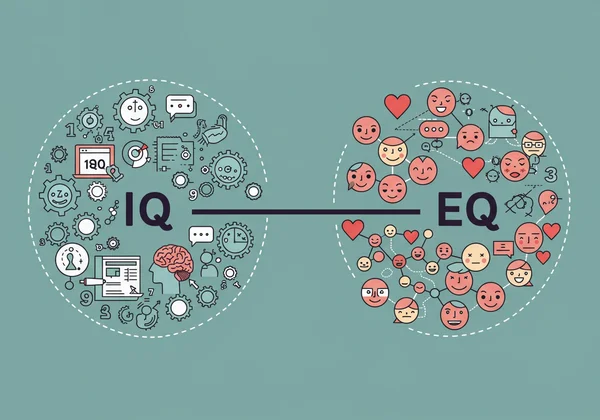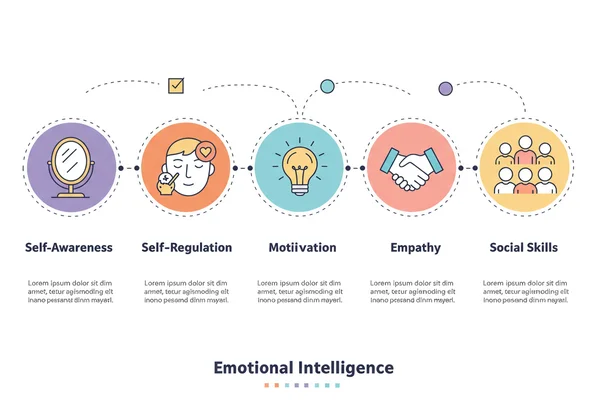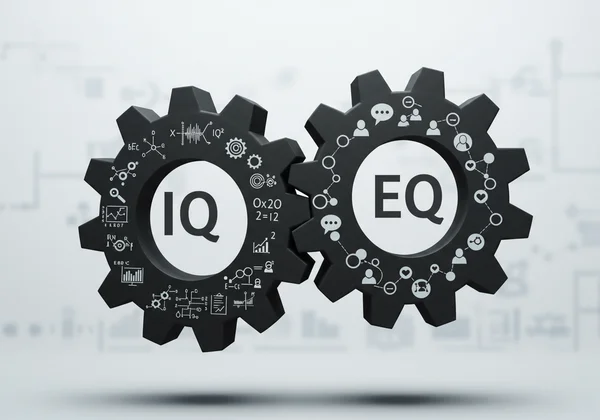EQ Test vs. IQ: Which Predicts Success Better in Life & Career?
November 11, 2025 | By Isla Caldwell
For decades, the Intelligence Quotient (IQ) was seen as the gold standard for measuring potential. We believed that a high IQ—a measure of cognitive abilities like logic and reasoning—was the ultimate key to a successful life and a thriving career. But as we've explored the complexities of human interaction and achievement, a new contender has emerged: Emotional Quotient (EQ). For anyone driven by self-improvement, a critical question emerges: is EQ or IQ more important for real-world success?

The debate between book smarts and street smarts isn't new, but our understanding of it has evolved dramatically. While IQ certainly plays a role, a growing body of research suggests that Emotional Intelligence is a far more reliable predictor of happiness, strong relationships, and professional excellence. Understanding where you stand is the first step toward unlocking your true potential. If you're ready to begin that journey of self-discovery, you can take our free EQ test to get a baseline of your emotional skills.
Defining the Measures: What Are EQ and IQ?
Before we can compare them, it's essential to understand what each of these metrics truly represents. They measure distinct, though sometimes overlapping, aspects of human intelligence. Think of them as two different toolkits you use to navigate the world.
Understanding Intelligence Quotient (IQ): The Traditional View
IQ is a score derived from standardized tests designed to assess human intelligence. Its primary focus is on your cognitive abilities. This includes your capacity for:
- Logical reasoning and problem-solving.
- Learning and retaining information.
- Abstract thinking and pattern recognition.
- Verbal and mathematical skills.
A high IQ indicates that you are likely a quick learner, adept at seeing connections others might miss, and skilled at tackling complex, analytical problems. It’s the kind of intelligence that helps you excel in academics or master technical skills.
Exploring Emotional Intelligence (EQ): Beyond Book Smarts
Emotional Intelligence (EQ), or Emotional Quotient, is the ability to perceive, use, understand, manage, and handle emotions. It's not about being "nice" or suppressing your feelings; it's about being emotionally aware and using that awareness to guide your behavior and thinking. EQ is generally broken down into five core components:
-
Self-Awareness: Recognizing your own emotions and how they affect your thoughts and behavior.
-
Self-Regulation: The ability to control impulsive feelings and behaviors, manage your emotions in healthy ways, and adapt to changing circumstances.
-
Motivation: A passion for work for reasons that go beyond money or status; a drive to pursue goals with energy and persistence.
-
Empathy: The ability to understand the emotions, needs, and concerns of other people.
-
Social Skills: The capacity to manage relationships, build networks, find common ground, and build rapport.

An accurate EQ test helps measure these crucial life skills.
The Core Differences: How EQ and IQ Operate
While both are forms of intelligence, their application in our daily lives is fundamentally different. IQ is about what you know and how you think, while EQ is about how you feel and how you act.
Cognitive Abilities vs. Interpersonal Acumen
IQ powers your ability to solve a difficult math problem, write a complex piece of code, or analyze a dense legal document. It's your "hard skill" engine. In contrast, EQ governs your interpersonal acumen. It helps you navigate a tense negotiation, inspire your team after a setback, or provide comfort to a friend in need. It's the "soft skill" framework that allows your hard skills to shine.
How Are They Measured? Tests and Assessments
IQ is measured through standardized tests like the Stanford-Binet or Wechsler Adult Intelligence Scale. These tests are rigid, with right and wrong answers. An EQ assessment, on the other hand, often uses situational questions to gauge how you might react in various scenarios, providing insight into your emotional patterns. The goal isn't a "correct" answer but an honest reflection of your tendencies, which you can discover your EQ with.
The "High IQ, Low EQ" Paradox: Why Smart People Struggle

We've all encountered it: the brilliant colleague who can't work in a team, the genius inventor who alienates investors, or the highly skilled manager nobody wants to work for. This is the high IQ low EQ paradox in action. It’s a powerful reminder that raw intelligence, without emotional awareness, can become a liability.
Common Scenarios and Their Impact
A person with high IQ but low EQ might struggle in several ways:
- Poor Communication: They might be blunt, insensitive, or unable to "read the room," causing friction and misunderstanding.
- Conflict Avoidance or Escalation: Lacking emotional regulation, they may either shut down or become overly aggressive during disagreements.
- Lack of Empathy: They may find it difficult to understand a coworker's perspective or a client's frustration, leading to strained relationships.
- Resistance to Feedback: They may view constructive criticism as a personal attack rather than an opportunity for growth.
These challenges can stall careers and damage personal relationships, regardless of how intellectually gifted a person is.
The Overlooked Power of Emotional Skills
Emotional skills bridge the gap between your ideas and their successful implementation. Empathy allows you to connect with others, self-regulation helps you remain calm under pressure, and strong social skills enable you to persuade and inspire. These aren't just "nice-to-have" traits; they are fundamental leadership and life skills. By working to improve emotional intelligence, you build the foundation for lasting success.
When EQ Takes the Lead: Impact on Life and Career Success
While IQ might get you in the door, it’s EQ that helps you climb the ladder and build a fulfilling life. In almost every field, especially in leadership roles, EQ emerges as the primary predictor of success.
Building Stronger Relationships with Empathy
Whether it's with your partner, children, or colleagues, empathy is the glue that holds relationships together. The ability to understand and share the feelings of another person builds trust, fosters collaboration, and creates deep, meaningful connections. People with high EQ are often seen as more approachable, supportive, and trustworthy.
Mastering Challenges Through Self-Regulation and Motivation
Life is full of setbacks. A high IQ won't stop you from feeling frustrated when a project fails or anxious before a big presentation. However, high EQ gives you the tools to manage those feelings. Self-regulation allows you to stay composed and think clearly under pressure, while intrinsic motivation helps you persevere in the face of adversity. This emotional resilience is a key differentiator between those who succeed and those who give up.
The Synergistic Approach: Leveraging Both EQ and IQ for Optimal Success

The debate isn't about choosing one over the other. The most successful and well-adjusted individuals are those who cultivate and leverage both forms of intelligence. IQ provides the cognitive horsepower, while EQ provides the steering, brakes, and navigational system.
The Ideal Blend: Why You Need Both
Think of a skilled surgeon. Her high IQ allows her to master complex medical knowledge and surgical techniques. But it's her high EQ that enables her to communicate with a patient's family with empathy, lead her surgical team calmly during a crisis, and manage the immense stress of her job. One without the other would make her far less effective. The same is true for leaders, parents, artists, and professionals in every industry. Ready to check your EQ level?
Mastering Your Potential: The Power of Both EQ & IQ
While IQ remains a valuable measure of our cognitive abilities, emotional intelligence has undeniably emerged as the more powerful predictor of success in the multifaceted arenas of life and work. It governs our relationships, our resilience, and our ability to lead and inspire. The best part is that, unlike IQ which remains relatively stable, your EQ can be developed and strengthened throughout your life.
The journey to a higher EQ begins with self-awareness. Understanding your emotional strengths and challenges is the first, most crucial step. If you're ready to gain that insight and unlock your full potential, we invite you to start your EQ test today. It’s free, quick, and the first step on a transformative path.
Your Questions About EQ, IQ, and Success Answered
What is a normal EQ score, and how is it measured?
Unlike IQ, there isn't one universal "normal" score for EQ, as different tests use different scoring models. Generally, scores are presented in a range that helps you understand your proficiency in key areas like self-awareness and empathy compared to a general population. Our EQ assessment provides you with a comprehensive score and a summary that highlights your unique emotional profile, giving you a clear starting point for growth.
Is high EQ or IQ generally considered "better" for overall life success?
While both are important, most modern research points to high EQ as being "better" for overall life success. This is because life success is often defined by the quality of our relationships, our job satisfaction, and our personal well-being—all areas where emotional intelligence is the primary driver. A high IQ may lead to academic or technical success, but EQ is what translates that into a happy and fulfilling life.
Can a person have a high IQ but low EQ, and what are the implications?
Absolutely. This is a common phenomenon. The implications can be significant, often leading to what is called "derailed success." A person with this profile may struggle to collaborate with teams, manage stress effectively, build lasting personal relationships, or inspire others, which can severely limit their career advancement and personal happiness despite their intellectual brilliance. Understanding this imbalance is key to addressing it and you can explore your potential with our insightful tools.